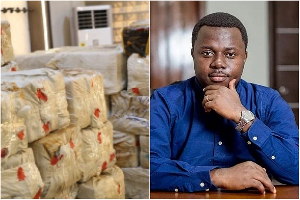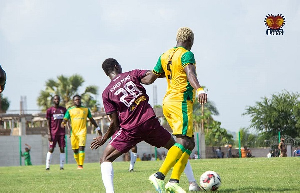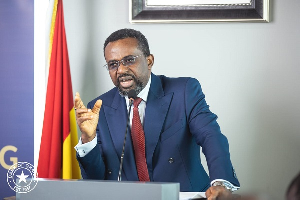By Michael J.K. Bokor, Ph.D.
E-mail: mjbokor@ilstu.edu
“With the elections over, there is only one Ghana. There is no NDC Ghana; there is no NPP Ghana; there is no CPP Ghana. There is one Ghana… With the elections over, there is only one Ghana to fight for.… The time has come to work together to build a better Ghana… I assure Ghanaians that I will be President for all.” The above passion-filled words came from President-elect, Professor John E.A. Mills, when he spoke to NDC supporters who had gathered at his campaign office at Osu in Accra after the Electoral Commissioner had declared him the winner of the just-ended Presidential polls. There is no doubt in my mind that these words encapsulate what can be safely considered as the synopsis of his political vision and agenda for administering the affairs of state. In drawing this conclusion, I am guided by his claim that the NDC’s return to power had been achieved through a long struggle that was not without sacrifices. True. These passionate words are soothing and instructive. Coming from the politician popularly called “Asomdwehene,” these words have a big impact on me because I see them as reflecting the convictions of the leader of a party that had endured and survived all kinds of acrimony from its detractors in other political camps, especially the Kufuor-led NPP administration. Many interesting issues resulting from the re-emergence of the NDC can be identified and discussed. I remember very well the claims by several NPP bigwigs that their party would set a record by being the first in the country’s political history to hand over to itself. President Kufuor had particularly claimed that he would hand over the baton of office to a new NPP government. That wish fizzled out into nothing but gasps of sharp disappointment and a rude awakening that records are set by those who know how to set them. To their chagrin, this record has rather been set by the NDC, their avowed rival. Here, then, is the significance of the NDC’s return to power:
1. This is the first time in Ghana’s political history that a party that had ever tasted power has been returned to office through constitutional means after successful general elections.
Furthermore, this is the first time that a former Vice President has been elected to office as the substantive President. This elevation should give that former Vice President the free-hand to implement good policies, some of which might even have been enunciated by the government in which he was Vice President but which, for political reasons, were discarded by the government that took over from the NDC. It is not dangerous to guess that with the stock of experience behind him, he is well placed to know his bearing in the corridors of power. While out of office, he might also have learned useful lessons from observing the inadequacies of the outgoing NPP government as it struggled to tackle national problems. And Professor Mills’ constant criticism of the Kufuor government makes informs me that he has learned a lot to help him steer clear of the minefields in governance. I hope he does so.
2. For the first time, a party that handed over power to its rival eight years ago has returned to power without any disruption of the constitutional process in the Fourth Republic. This return should help move Ghana further to the point where the performance of the different governments can provide the electorate with material for comparative analysis and opportunities for making decisions on who should rule the country at each turn of the electoral process. It is ample demonstration that the Ghanaian electorate have matured and could be relied on to use their own free will to choose their leaders.
3. The varying relationships between the two civilian governments since 1992 and the security apparatus and the media will also provide enough food-for-thought by this emergence of Prof. Mills as the substantive President. We all know that the Rawlings administration metamorphosed from a military-dominated one to a civilian one by 1992 although the military clout was still prevalent. Then, although outgoing President Kufuor relied very much on the police, the military lurked at the background as the government used the troops to a limited extent, judging from the 2008 elections. The media featured in diverse guises. The question is: How will an Atta Mills government present itself?
4. The national elections exposed serious problems of ethnicity in terms of allegiance to the NDC and NPP, respectively, by the electorate in the different regions. We can all tell from the pattern of voting that the country is divided along ethnic lines, which could degenerate into entrenched cleavages if not addressed carefully. The bald fact is that the country is divided; and much of what happened under the Kufuor-led government gives me cause to blame it for the heightening or sharpening of such ethnic differences.
It is on record that in 2001, the NPP government did not appoint anybody from the Upper East or Upper West Region as any of the first crop of Cabinet Ministers. The claim was that nobody capable of serving in the Cabinet could be identified. This claim couldn’t be less disparaging today that the NPP is leaving office than when it was first presented. The harm still hurts. Then, most of the appointees were Akans, which drew much criticism of nepotism and tribalism against Kufuor. He did not budge, though. Such ethnic divisions are too explosive for the country and must be tackled. The NDC should demonstrate its national character through the caliber of people that Prof. Mills appoints to positions of trust in his government. So far, we can get glimpses of that possibility, judging from the composition of the Transitional Team (which reflects that national complexion), even though some eyebrows may be raised at the re-emergence of certain personalities among them. This issue is worth discussion on its own merit at another level.
5. One major issue to dominate public discourse is the failed property-owning democracy of the NPP as against the “Social Democratic” agenda of the NDC (including the self-help spirit that the Rawlings government had encouraged). This issue concerns public expectations of government’s responsibilities. The people have had the chance to analyze the two governments’ different approaches to solving national problems and to make informed decisions on whom to vote for at election time.
One of sources of bitterness among NPP functionaries was the claim that even though the NPP government had done better than the first NDC administration in providing development projects for the people, especially those in the Volta Region, they refused to retain it in power. This “baiting” of the electorate through so-called development projects has been brought to the fore. And by rejecting the NPP, the voters have demonstrated that they cannot be lured with such projects to do the party’s bidding. This choice of the NDC, thus demonstrates the electorate’s willingness to take risks that will not only test the tenacity of Ghana’s constitutional democratic system but that will also expose inherent inadequacies to be addressed---a good opportunity to introduce reforms to strengthen the process.
6. The Electoral Commission, particularly, was tested and its successful handling of issues showed that it passed that test despite some initial problems that threatened public confidence in it. The nurturing of public confidence should be encouraged in this institution to help it perform its legitimate functions. We can’t do without it.
7. More importantly, the relatively peaceful elections and return to normal activities by the various segments of the citizenry will give the international community enough insights into the nature of the Ghanaian political scene and reassure investors that the country is genuinely working hard to reinforce democracy and that their investments would be safe in the country’s stable political dispensation.
Now, the victory has been achieved. What next? Even before he is inaugurated into office, the NDC’s Prof. Mills knows that he will be confronted with a heavy responsibility to give Ghanaians the hope they’ve been looking for all these years through the NPP’s mirage of “Positive Change” to his own “I Care For You” slogan and the NDC’s own brand of “Change.” His broad vision for Ghana can be inferred from his own pre-election avowal: “My dream is that Ghana in this century will be the nation that leads Africa…. An educated, thriving, and prosperous democracy, that we can hold up as an example to the world of what Africa can be, when its people move and work together.” This declaration is an important statement that underpins his strategies for governance. But wait. He has more to add in reassuring the Ghanaian populace: “There will be no discrimination…. Atta Mills will be father to everybody.” These declarations are reassuring but should be given substance to go beyond being mere grand designs on paper or mere sugar-coated slogans on people’s lips. I have an apt insight from an anonymous writer for the NDC leaders: “And when the shadow fades and is no more, the light that lingers becomes a shadow to another light.” Today, the NPP is that shadow that fades; and the NDC is the light that lingers. The lesson is that if it fails to satisfy the aspirations of the electorate, it will become a shadow to another light, which is another political party. Whether that party will be the NPP or not is in the womb of time. Let it not be said after four years that the electorate tended the NDC when it was weak in opposition and raised it to the citadel of power only for it to be the cause of very great misfortune to them. When a hungry predator catches a prey, it is because it wants to eat it, not because it wants to give it to others and continue to languish in hunger, pain, and despair. The people have opted for the NDC and Professor Mills and his team must work hard to justify that trust now being reposed in them. That way, the significance of the NDC’s return to power will endure.
Opinions of Friday, 9 January 2009
Columnist: Bokor, Michael J. K.














